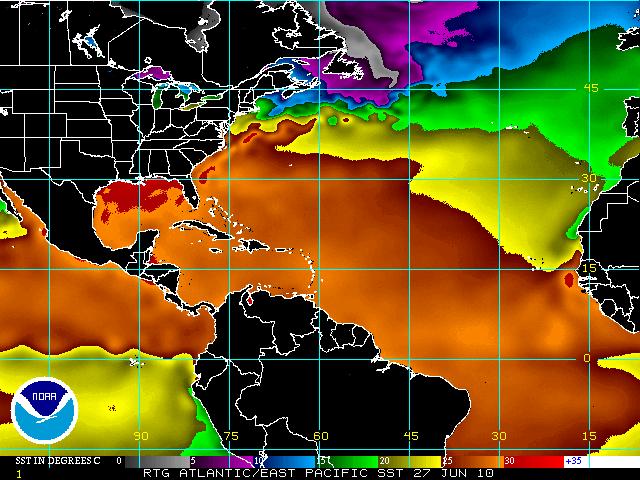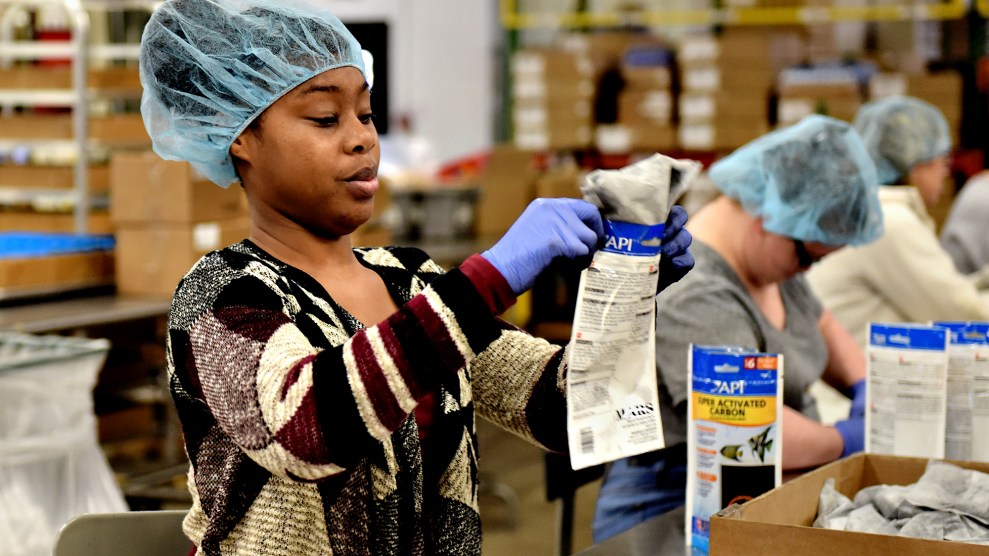
Image courtesy NOAA
From this point on it this summer it becomes impossible to think about the oil catastrophe in the Gulf of Mexico without talking about the weather.
- First off, there are record-breaking high sea surface temperatures (SSTs) in the Gulf of Mexico right now. This map gives you a sense of just how hot those waters are compared to the Atlantic, Caribbean, or equatorial Pacific at the moment. (The map scale is in centigrade, convertible to Fahrenheit here.)
- So the question naturally arises, are these record-breaking SSTs in any way related to the fact that oil is covering a large part of the surface waters of the Gulf? A lot of scarily high temperatures are coming in from NOAA’s buoy #42040, 64 nautical miles south of Dauphin Island, Alabama. There’s an interesting discussion of that at Jesse Ferrell’s WeatherMatrix blog. Are the sensors gummed with oil? Or is it really that hot? In regards to air temperatures, Ferrell writes:
“It’s been fairly hot all over the Gulf States this month—not including Texas there have been over 100 daily record highs reported so far in June. In the Florida Keys, it’s the hottest first half of June in recorded history.
- Whatever the fate of the instruments at the #42020 buoy, SSTs in much of the northern Gulf are above 84 degrees F already. In this high resolution NOAA-AMOL image, you can see how closely the hot water mirrors the oiled water.
- Roy Spencer, a climate denier published by the überconservative Encounter Books, doesn’t think the oil is contributing to the warmer waters of the Gulf. Maybe it is. Maybe it isn’t. But Spencer also doesn’t believe we have anything to fear from more carbon dioxide in the atmosphere.
- Jeff Masters at WunderBlog discusses whether the oil on the surface of the Gulf’s waters might reduce evaporation enough to limit the growth-potential of a tropical storm system:
“Hurricanes are sustained by the heat liberated when water vapor that has evaporated from warm ocean waters condenses into rain. If one can reduce the amount of water evaporating from the ocean, a decrease in the hurricane’s strength will result. Oil on the surface of the ocean will act to limit evaporation, and could potentially decrease the strength of a hurricane. However, if the oil is mixed away from the surface by the strong winds of a hurricane, the oil will have a very limited ability to reduce evaporation. According to a 2005 article in Popular Science magazine, Dr. Kerry Emanuel of MIT performed some tests in 2002 to see if oil on the surface of water could significantly reduce evaporation into a hurricane. He found that the slick quickly dissipated under high wind conditions that generated rough seas.“
- Masters writes this evening about the prospects for Tropical Storm Alex:
“Satellite loops show that Alex has a very large circulation covering about 2/3 of the Gulf of Mexico. We can expect that should Alex become a Category 2 or stronger hurricane, its storm surge will affect a much wider stretch of coast than Hurricane Dolly of 2008 did.
- Whatever the effects of oil on the water, and whatever Alex’s ultimate track path, it looks like there will be enough weather in the vicinity of the Deepwater Horizon gusher in the next few days to prevent BP from deploying its third oil containment rig.
- And if you check out this water vapor image in the next 24 hours, you’ll likely see a fairly energy intensive pulse of moisture coming off the west coast of Africa, en route to the Caribbean and maybe the Gulf, sometime in the next week or so, along a route known as Hurricane Alley.












